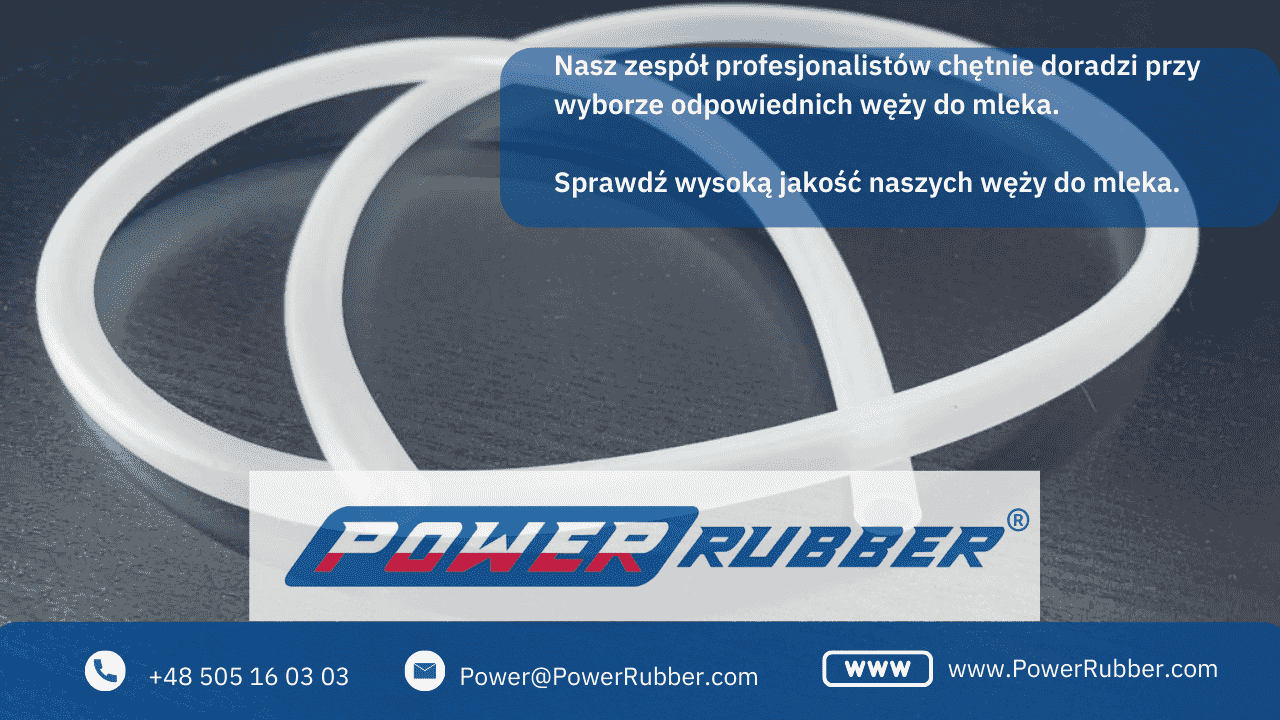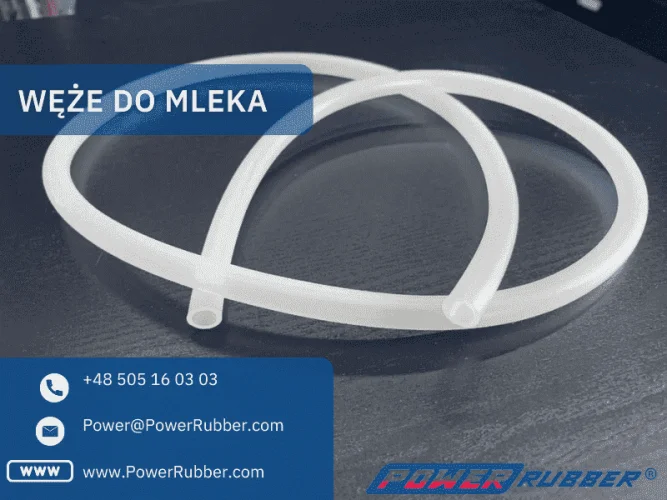Milk hoses
09.04.2020
Milk and products based on it, i.e. cream, buttermilk, kefir and cheese constitute a significant part of the food industry. The high demand for dairy products, including butter or yoghurt, also requires high specialization of dairy processing plants. Due to intensive use, the milk pipe must be very durable and resistant to mechanical damage and weather conditions, including various temperatures. Such tubes are used not only at the stage of the production and obtaining of milk, but also in transport. Ensuring sanitary safety is equally important, therefore the hoses, before the distribution circuit, undergo demanding quality tests, meet the applicable standards and requirements of individual approvals. High-quality milk hoses are an obligatory element of the equipment of every dairy, so it is worth getting acquainted with their properties and guidelines for caring for their cleanliness. 

Milking machine - necessary parts of construction and mode of operation
Dairy is a rapidly growing industry and the demand for dairy products continues to grow. For many years, professionals from the industry have developed a number of mechanical or system amenities that are designed to facilitate their work and better control over the quality of the milk obtained. A milking machine is a device which - as the name suggests - supports the dairy farmers in milking cows. By imitating the natural human movements, it works in two modes, alternately: sucking and squirting after squeezing. The pressure in the special flexible suction line is usually around 50 kPa. The collected milk flows to the so-called pool, i.e. a capacious tank that acts as a cooling liquid. Here, the milk is kept at a temperature of only a few degrees above zero to keep it fresh for as long as possible, awaiting further processing or transport to another plant. Several types of milking machines are used in the dairy industry, but the most common type uses high-quality milk pipes. These are necessary elements of this type of machines, and their proper selection ensures long-term durability and high work efficiency, with a low load and discomfort of breeding cows.Milk pipe - technical specifications
The tube is made of a rubber material with a smooth surface on the inside, and on the outside it often has an embossed pattern or fabric imprint. Additional wire spirals inside are used to strengthen the structure. Manufacturers recommend that despite the high strength of the material from which the milk pipes are made, in order to maintain the longest durability of the equipment, the working temperature inside them should be in the range of -30 degrees Celsius. Celsius to +70 Celsius, and periodically up to +110 degrees Celsius (for example when cleaning the hose with steam). The pressure, depending on the diameter of the conduit, can range from 0.2 MPa to 2 MPa. One of the greatest advantages of this hose material is its multi-functionality and exceptional ease of general cleanliness. However, to ensure the best possible conditions for the production of perfect milk on a daily basis, it is important to keep it fresh. Professional preparations, dedicated to the disinfection and sterile maintenance of milk pipes, are widely available in stores. Concentrated chemicals remove grease and other possible residues much better than ordinary water. However, they should be used as a last resort. The milk hosesoffered in the online store on our website have the necessary approvals, guaranteeing the suitability for contact with food and liquids. Thanks to the high-quality material used in the production of milking machine hoses, microcracks do not appear, even in connection with their intensive use. This prevents milk residues from accumulating in crevices and creases, and therefore prevents harmful bacteria from multiplying and spreading further. A large number of breeders notice that due to the high tolerance even to high temperatures, up to over two hundred degrees, the silicone material used in the production of pipes can be easily and cheaply disinfected by thoroughly boiling them in boiling water without the addition of special concentrated chemicals. However, such a procedure may take up to 30 minutes in order not to adversely affect the structure of the tubes and the quality of the pumped milk. The silicone regenerates quickly and can therefore be used for further work.
The use of rubber hoses
Milk pipes are usually made of various types of elastomers, but the most popular ones are made of silicone or other single-colored rubbers. As technical equipment, they are very practical and have a smooth surface on the inside. This simple solution is used so that the fluid can flow freely without entering any gaps or recesses. The deposition of thick liquid in such narrow tubes could result in blockages, the appearance of mold and general wear and tear of the device. Hence, already at the production stage, great care is taken to ensure that the diameter of the tube allows for optimal milk flow during suction and then squirting. The material used for the production of these hoses is flexible, and therefore gives great arrangement options in relation to the machine structure and the size of the cow. Cables made of silicone are able to withstand a very wide temperature range from -40 degrees Celsius up to +270 degrees. However, despite this, it is recommended under operating conditions to keep a maximum of +70 degrees. On the other hand, high resistance to cold means that the milking tubes can also be used during winter, without the slightest fear of possible damage. The lines have a relatively wide range of applications as they are generally intended for the delivery and suction of food liquids. Although they are most commonly used in the dairy industry, including for transportation, there are many more functions to these flexible products in the form of thin, usually transparent tubes. When used in dairies, the flexibility of the rubber material allows for trouble-free mounting of the milking machine on the udder, even by a less experienced person. The lightweight silicone material ensures gentle milking and relief for the cow. However, they can also be used for infusing liquids containing alcohol with a maximum concentration of 96% and acidic products with a pH lower than 4.5. The use of certified silicone pipes in this case ensures that no smell or taste is transferred to the pumped liquids, so that the pipes do not leave any changes in the pressed product.High-quality products used in the dairy industry
The industry involved in the production and distribution of milk and dairy products is a very demanding sector in the modern market. High competition requires entrepreneurs to constantly introduce newer and more innovative solutions that improve the quality and efficiency of product manufacturing. This would be, on the one hand, a way to remain an attractive manufacturer in its industry, and on the other hand, to meet the ever higher and changing customer requirements. A huge number of highly technologically advanced machines, including milking machines and pasteurizers, located in dairies and other plants, require sealed insulators and ring gaskets for the constant, uninterrupted and efficient operation. They not only protect the machines against damage, but also suppress noise. Due to the wet floor, rubber mats can be an excellent way to keep the workplace clean, and at the same time a non-slip surface. We cordially invite you to familiarize yourself with all the products offered in the online store on our website. Milk hoses, like the entire range, have the necessary and valid approvals that confirm their safety in contact with food. We know how important it is to choose the right model tailored to your individual needs, so feel free to contact us. We are happy to advise you in choosing the right product and variant to meet all high expectations. From the beginning of our activity, the priority is the high quality of products, the availability of a wide range of products and, above all, customer satisfaction. We hope you will find what you currently need in our store.
